In 2023, affiliate marketing spending reached $9.56 billion in the United States alone, and it’s responsible for an estimated 16 percent of ecommerce sales globally.
As brands continue to tap into the power of affiliate marketing, gaining valuable insights into partner and program performance through affiliate tracking becomes imperative for sustained growth.
In a nutshell, affiliate tracking captures and monitors marketing activities—including clicks, traffic, and conversions—from affiliate links shared by your partners. Gaining a deeper understanding of these performance metrics helps brands determine the effectiveness of their affiliate program and strategize ways to optimize for success. By analyzing click-through rates and conversion data, marketers can refine their attribution models and improve campaign ROI.
Ongoing changes in data privacy legislation and corporate policy require marketers to review and update their affiliate tracking methods to remain compliant without compromising the efficacy of their affiliate campaigns.
Get a comprehensive overview of affiliate tracking methods and learn how to futureproof your marketing efforts in a privacy-first world.
- 7 key benefits of affiliate tracking for partnerships program success
- Affiliate tracking software: What it is and popular options
- 6 common affiliate marketing tracking methods
- Winning outcomes of accurate affiliate tracking [with the right partnership management platform]
7 key benefits of affiliate tracking for partnerships program success
Affiliate tracking remains fundamental to nurturing a thriving partnerships program. Brands gain access to valuable data to understand and optimize partnerships for growth in the following ways.
- Identify high-performing affiliates to maximize ROI by focusing resources on partners that drive the most value.
- Allocate marketing budgets more effectively with clear tracking insights that reveal the most profitable channels and partners.
- Improve campaign strategies with real-time data that highlights opportunities for optimization and growth.
- Reduce wasted spend by early detection of fraudulent activities, ensuring your investments generate authentic results.
- Foster stronger, data-backed partnerships by leveraging transparent performance metrics, driving mutual success.
- Tailor promotions to match audience behavior using detailed tracking analytics that uncover consumer preferences and trends.
- Measure the true impact of affiliate marketing on business growth, gaining clarity into how partnerships contribute to core KPIs.
Affiliate tracking software: What it is and popular options
Affiliate tracking software helps brands monitor, manage, and optimize their affiliate marketing programs. These tools form part of a broader affiliate management software stack, allowing marketers to combine tracking, reporting, and partner relationship management in one platform. It automates tracking partner activities—like clicks, conversions, and revenue—giving you accurate data to measure performance.
How it works
Most tracking methods use a unique tracking link. Each link contains identifiers assigned to each affiliate, enabling the software to track user behavior after clicking an affiliate’s link.
Types of affiliate tracking software [with pros and cons]

1. Standalone affiliate tracking software
These are specialized tools designed exclusively for affiliate tracking. They focus on providing in-depth analytics and tracking functionalities without additional marketing features.
Pros
- Typically more cost-effective for smaller businesses
- Simplified interface for those who only need tracking features
Cons
- Limited scalability for advanced marketing needs
- Integration with other marketing systems might require additional tools
2. Affiliate networks
An affiliate network acts as both the tracking software and a marketplace where brands can connect with affiliates. Each affiliate has a unique affiliate ID that helps ensure accurate tracking and commission attribution.
Pros
- Access to a large network of pre-vetted affiliates
- Built-in tools for tracking and managing campaigns
Cons
- Usually involves network fees that can add up quickly
- Less control over direct relationships with affiliates
3. Management platforms
Management platforms such as impact.com go beyond basic tracking by offering automation, analytics, and partnership management tools. These platforms aim to optimize the entire partnership lifecycle. Advanced affiliate management software also allows for granular tracking through click IDs and custom attribution models, helping marketers optimize partner ROI.
Pros
- Comprehensive features, including automation, fraud detection, and real-time reporting
- Scalable solution tailored for growing businesses or enterprises
Cons
- Higher price point compared to simpler tracking tools
- Steeper learning curve for beginners
4. Built-in affiliate tracking tools
Some e-commerce platforms, such as Shopify and WordPress, come with their affiliate tracking add-ons or plugins.
Pros
- Convenient for businesses already using the platform
- Easy to set up without requiring third-party software
Cons
- Limited tracking and reporting capabilities for larger campaigns
- May lack advanced fraud prevention measures
6 common affiliate marketing tracking methods
Partnership management platforms include built-in affiliate tracking software that offers various methods to suit your business. These methods range from simple affiliate link tracking to advanced server-to-server integrations, each suited to different affiliate management goals. There are six key methods used to track actions:
1. Javascript / first-party cookie tracking
This is often the default method of online event tracking, which places tracking codes—Javascript tags like impact.com’s Universal Tracking Tag—on every landing page. You can add these event trackers to the confirmation page where a conversion event occurs, including any other intermediate, non-monetary success event, such as account creation or sign-up for a newsletter. This type of tracking can capture click-through rates and conversion paths, similar to what you’d monitor in Google Analytics.
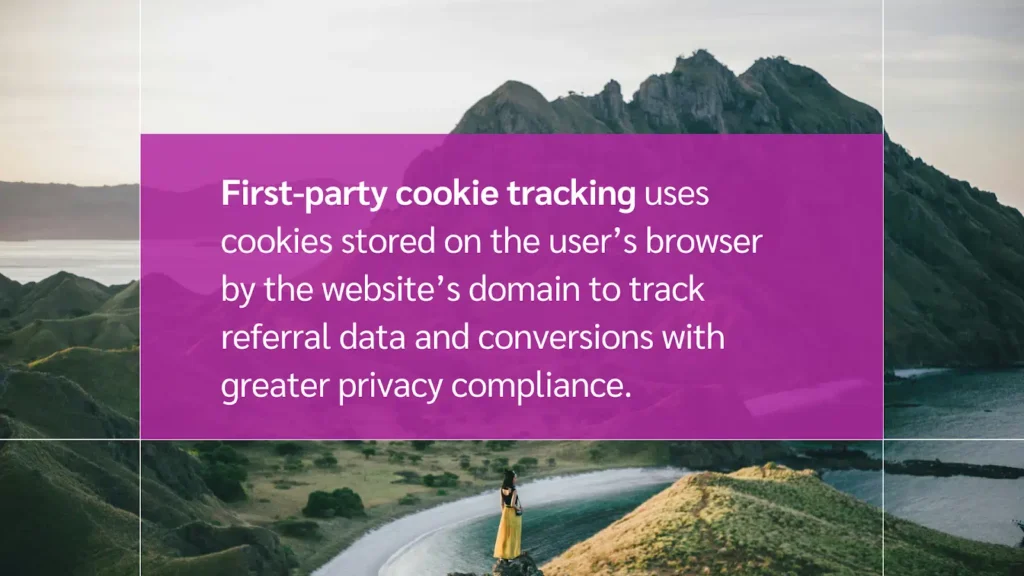
2. Server-to-server tracking
Also called “cookieless tracking”, this uses APIs to track conversion and click events. The API tracking method is the most future-proof solution as it’s fully compliant with Intelligent Tracking Prevention [ITP]. This method automatically sends click and conversion data to management platforms, like impact.com, via an API call. This approach eliminates the need for manual tracking and reduces the risk of data loss from browser restrictions.
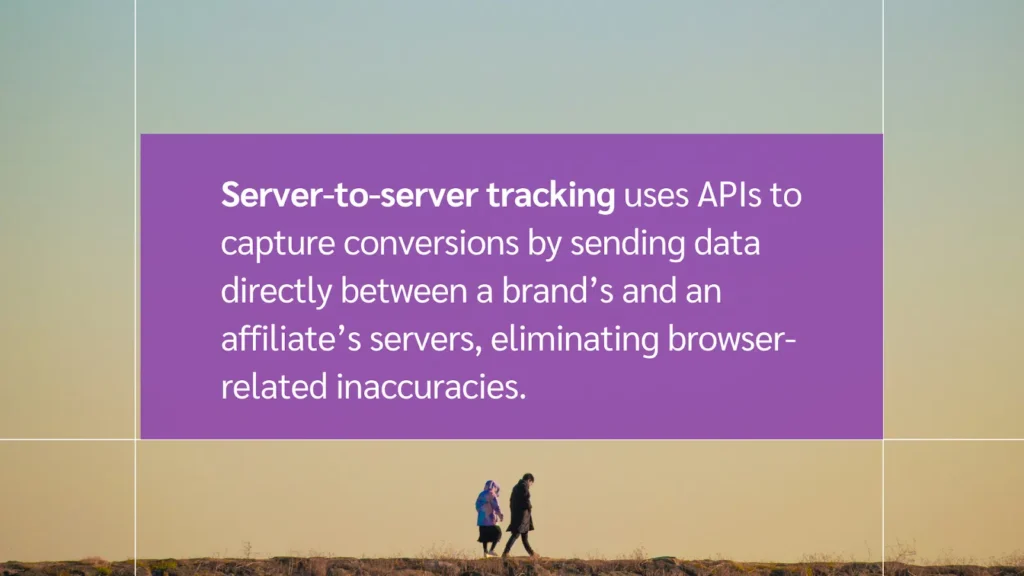
3. FTP tracking
FTP tracking uses an FTP server to receive and push tracking data. You capture data about visitors on your website before and after conversion, and store this data in first-party cookies. Then, you’ll create a .CSV file of all the conversions on the website, and submit them to a tracking platform via FTP, which compares data points to attribute credit to a partner and appear in reporting.
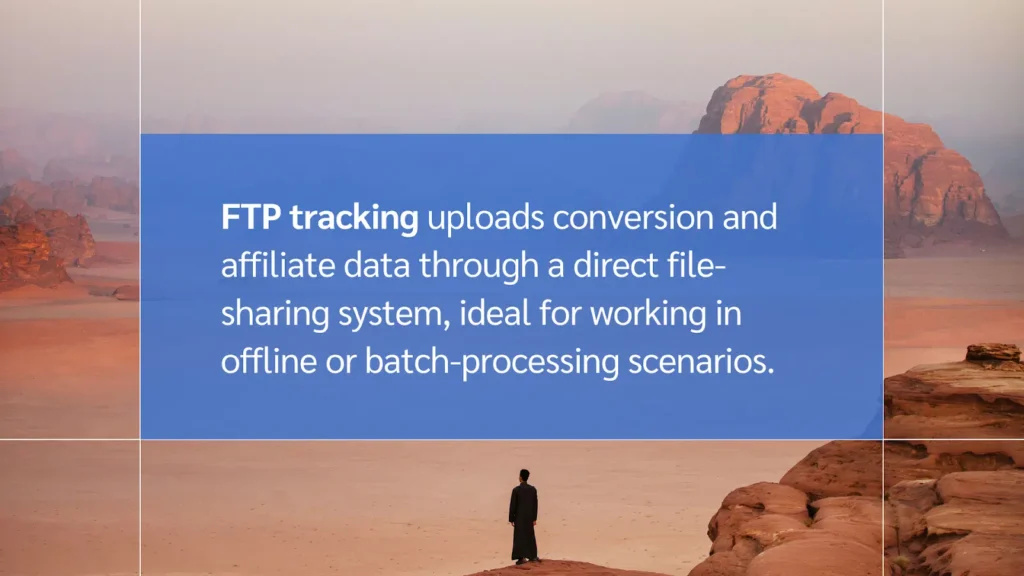
4. Promo code tracking
Promo code tracking monitors how partners aid a brand’s efforts. This tracking method associates a promo code used at the time of conversion with a partner so they receive credit. Promo codes can also be linked to specific affiliate links or IDs, providing a simple way to track sales when cookies aren’t available.

5. CPC (cost-per-click) tracking
This tracking method is used for CPC programs. This method enables brands to track and pay for clicks that drive traffic to their website.
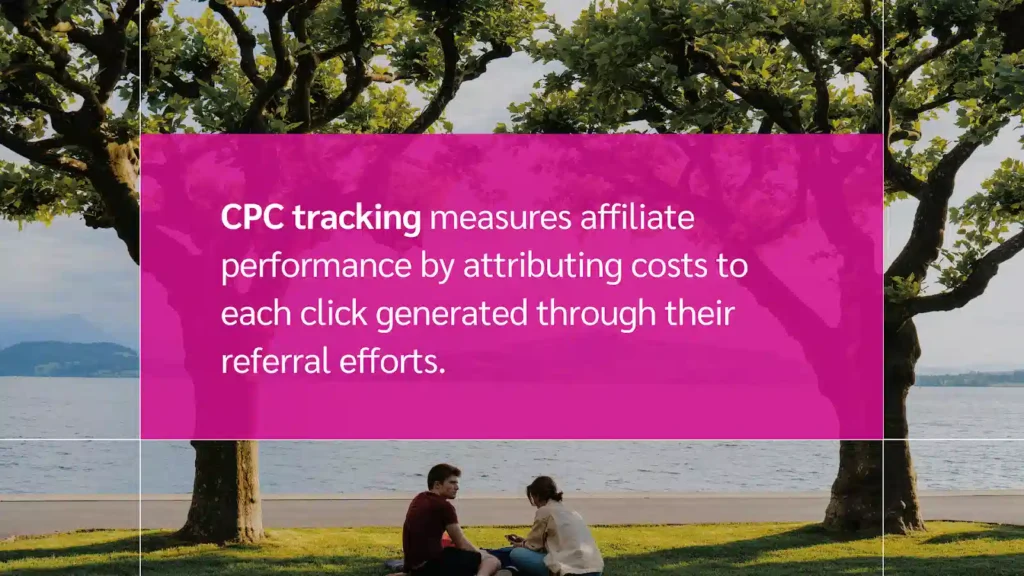
6. Direct tracking
This involves creating custom rules within the Javascript tag and assigning credit based on the partner’s referring URL without the partner needing to append any tracking parameters to their links.

Winning outcomes of accurate affiliate tracking [with the right partnership management platform]
Get an accurate view of the customer journey
Consumers often research on one device and take action on another. In fact, 80 percent of consumers worldwide visit a retailer’s website from their smartphone while shopping in-store. Modern attribution models help connect these cross-device interactions, ensuring credit is assigned to the correct affiliate link or campaign.
So, seeing the big picture with cross-device tracking helps you accurately monitor customer behavior and prioritize marketing spend to optimize the customer journey. Brands can link devices belonging to the same user and see how partners interact along the path to purchase alongside other channels.
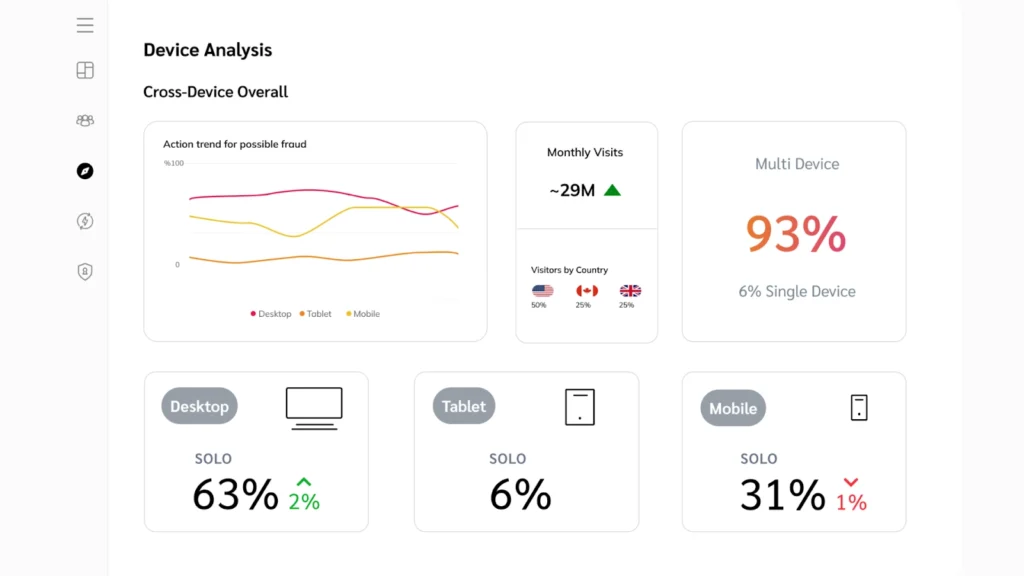
See the whole picture with cross-device tracking
Brands can use other partnership management platform features to streamline the user experience further. For example, impact.com’s TrueLink™ maximizes conversion rates by ensuring a smooth customer experience on mobile. Your partners use a single link that routes users along the optimal path, deep-linking them directly to the right product or offer page in your app or website.
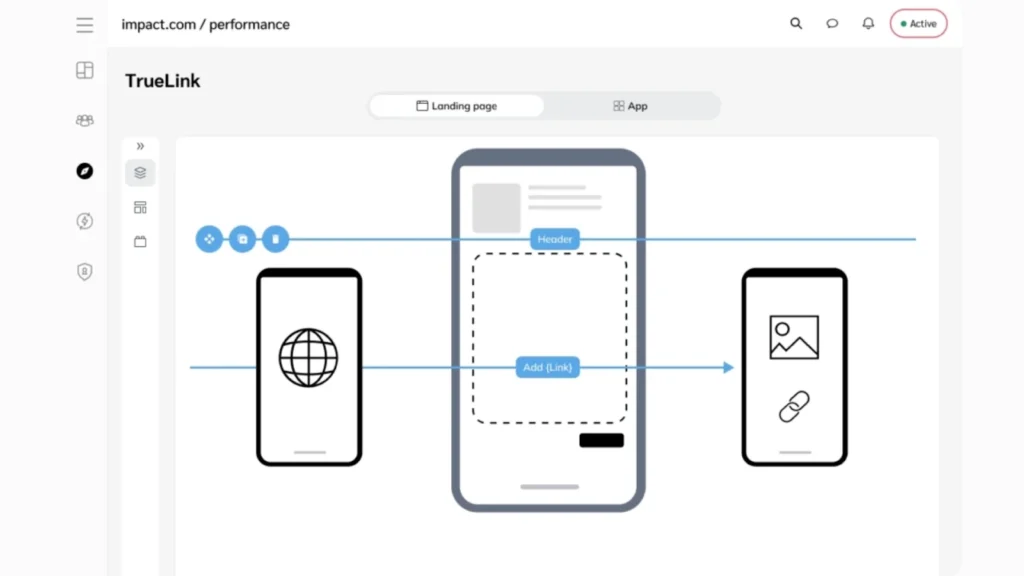
Streamline the user experience with TrueLink™
Track anything with methods that comply with evolving regulations & privacy
Partnership management platforms, like impact.com, allow brands to plug into APIs to get accurate, reliable tracking of conversions, credit app installs, and identify users across their devices.
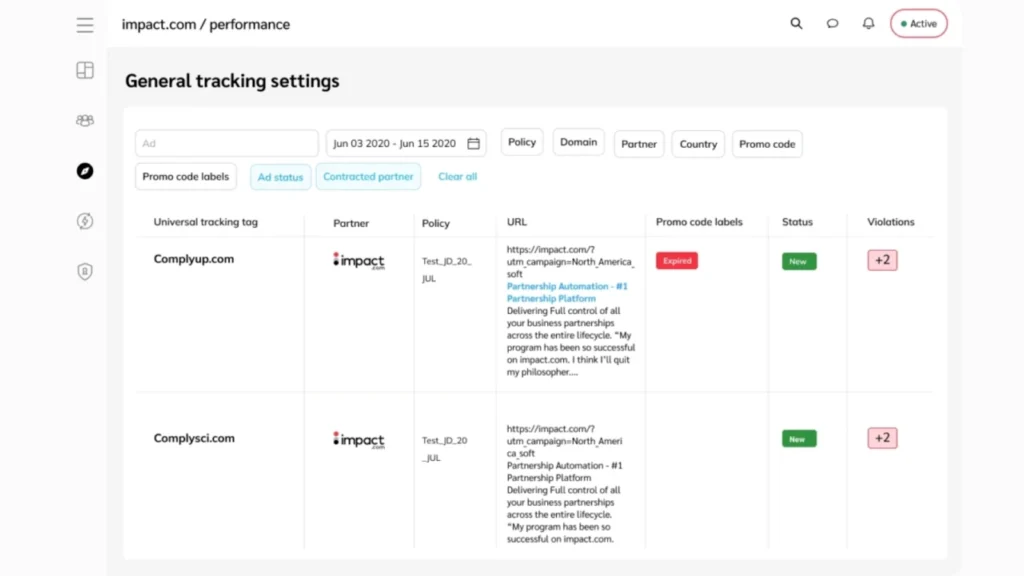
Your tracking, your choice with impact.com—from APIs to JavaScript-based solutions.
Google announced it will no longer phase out third-party cookies in Chrome. Instead, the search engine will let Chrome users set their privacy preferences, which will apply to their web browsing activities.
Though the industry can’t yet determine how this change will fully impact the advertising industry, advertisers who diversify their approach to cookie-based tracking will position themselves best to embrace changing audience preferences.
For instance, the impact.com platform provides excellent ITP-compliant alternatives like the Universal Tracking Tag [UTT]. Since the UTT sets cookies in a first-party context, they remain unaffected by consumer preferences to block third-party cookies.
Placing the UTT across your site gives you the most comprehensive tracking information about the consumer journey, direct traffic, conversion paths, etc.
Whether it’s GDPR, CCPA, or something else, privacy regulation is here for good. For extra privacy, impact.com protects all personally identifiable information (PII) that passes through the platform with ultra-secure HMAC-SHA256 encryption.
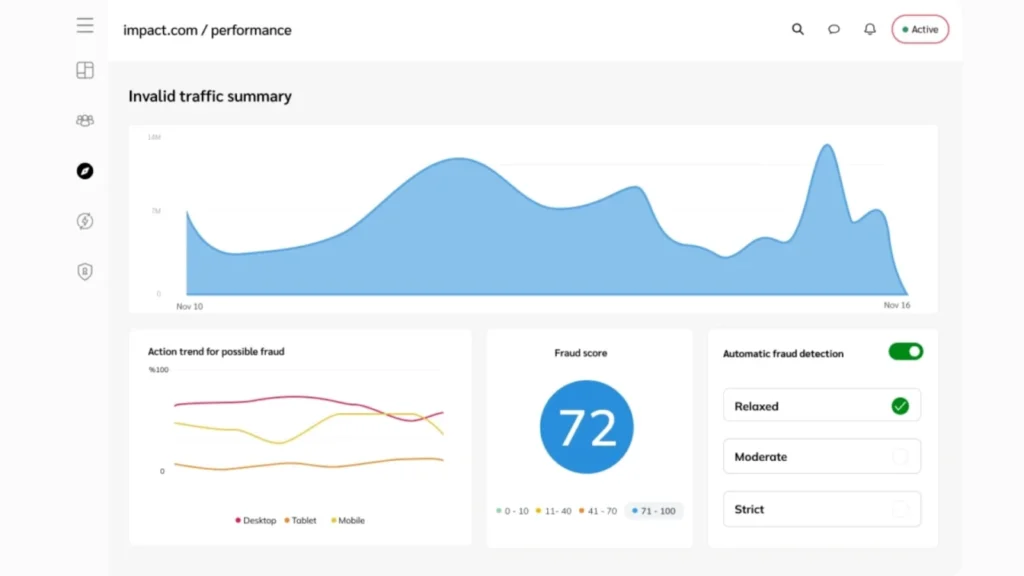
impact.com allows you to set how strict you want your program’s click filter policy to be.
Choose a partnership management platform with robust affiliate tracking software
Affiliate tracking software will amplify your program success. So, select a partnership management platform like impact.com that specializes in future-proofing your program with a modern, reliable approach to tracking. Discover how impact.com can help your brand find a consistent and accurate way to track partners.
Gain more insights into affiliate tracking with the following impact.com resources:



